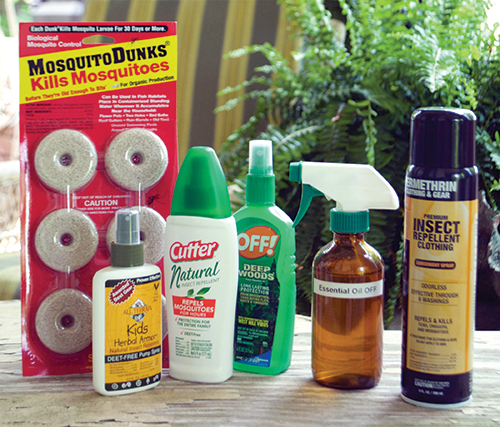Don’t let them bug you!
 Summertime not only provides lots of reasons to work and play in the yard and garden, but it also provides lots of chances to be bitten by ticks, mosquitoes, chiggers and variety of other biting and stinging pests, all of which are annoying, but some of which pose a real threat. Think Lyme disease, West Nile Virus and Zika, for examples.
Summertime not only provides lots of reasons to work and play in the yard and garden, but it also provides lots of chances to be bitten by ticks, mosquitoes, chiggers and variety of other biting and stinging pests, all of which are annoying, but some of which pose a real threat. Think Lyme disease, West Nile Virus and Zika, for examples.
Concerns about these insect-borne illnesses are legitimate, especially for those at high risk such as expectant women, young children and frail adults. Still, few of us want to be held hostage in our homes all summer, so what can we do? Several things, it turns out, many of which do not require the use of strong chemicals.
The first line of defense is to make our yards less pest-friendly. With mosquitoes, that means eliminating their favorite breeding grounds — areas of stagnant water. Simple actions such as cleaning out clogged rain gutters, discarding refuse such as old tires and cans and making sure outside toys, plant containers and trash cans don’t sit filled with water for too long will go a long way in reducing mosquito breeding sites.
But what about all those water-holding garden features we love, such as birdbaths, small ponds and rain barrels? Birdbaths should be emptied every few days and refilled with fresh water. Larger reservoirs (still ponds, rain barrels and the like) that can be more difficult to clean or empty can be treated with Bti-infused products. These “dunks,” bits or briquettes contain a natural bacterium that kills mosquitoes (as well as fungus gnats and blackflies) but won’t harm other creatures. They do need to be replaced or reapplied every 30 days or so, though.
Another way to keep mosquitoes (as well as ticks and chiggers, which thrive in grassy and brushy landscapes) away is to clean up landscape areas close to the house by trimming grass and shrubs regularly and removing dead leaves or other organic debris that may provide refuge or breeding areas for these pests.
Other methods touted to help control insect pests include inviting bug-eating wildlife into the yard and garden and using mosquito-repellent plants, bug zappers, over-the-counter foggers and sprays and citronella products. While there’s nothing wrong with recruiting birds, bats, lizards and toads to help out or planting flowers, herbs and other pretty plants that may repel bugs, research has shown that these methods aren’t highly effective. Citronella candles and torches, bug zappers and homeowner-applied foggers/sprays, some of which can be expensive, are also nominally effective, so they may be a waste of money.
No matter how hard we try to keep pesky bugs at bay, though, it’s impossible to completely eliminate them from our environs, so in addition to doing all we can to bug-proof the yard, we also need to bug-proof ourselves.
DEET-based insect repellents that contain at least 15 percent (but no more than 50 percent) DEET are highly effective, but so are plant-based repellents that use a lemon-eucalyptus or soy blend. These “natural” repellents, though, typically don’t last as long as the DEET-based options, so they need to be reapplied frequently. And, regardless of which repellent you use, make sure to follow the label instructions!
In addition to using repellents, wear long pants and long-sleeved shirts that fit snugly at the wrist whenever possible. To better protect from ticks, tuck your pants legs into your socks. Clothing can also be treated with a permethrin-based repellent, but this kind of repellent should never be used on the skin or on pets. If you’re relaxing outside and don’t want to be dressed in layers of hot clothing, using a fan (especially an oscillating fan) can help keep mosquitoes away.
These are just a few of the options, so to learn more about protecting yourself from mosquitoes, ticks and other bugs, check out the websites of the American Mosquito Control Association (www.mosquito.org), Alabama Department of Public Health (www.adph.org) and Alabama Cooperative Extension System (www.aces.edu). Information on the best repellents can be found at the Consumer Reports website (www.consumerreports.org).
June Tips
[list]
- Thin the number of fruits on apple, pear, peach and other fruit trees.
- Pinch back leggy annuals or tender perennials and deadhead flowers (gently pinch off spent flowers).
- Check roses for signs of disease or insect damage and immediately treat any problems.
- Divide and thin daffodil bulbs and irises.
- Sow seeds for beans, field peas, melons, pumpkins, squash and corn.
- Plant tomatoes, peppers, eggplants and sweet potatoes.
- Keep an eye out for insect and disease problems on landscape, vegetable garden and house plants and treat outbreaks immediately.
- Visit farmers markets for the freshest of summer produce.
- Treat lawn weeds as they emerge.[/list]
 Katie Jackson is a freelance writer and editor based in Opelika, Alabama. Contact her at [email protected].
Katie Jackson is a freelance writer and editor based in Opelika, Alabama. Contact her at [email protected].




